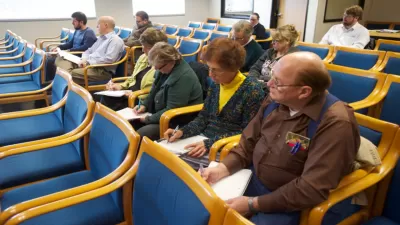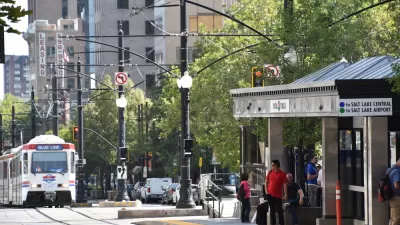A new study reveals the biases of the public planning process.

Tim Logan shares news of a new study from researchers at Boston University that analyzed "three years worth of meeting minutes from 97 cities and towns in the region, and found nearly two-thirds of residents who stood up to speak about proposed housing developments."
"The study also dug into who the commenters are, using a variety of public records to estimate age, voting history, and other factors, such as whether people own or rent their home," according to Logan.
That description of the study's methodology admittedly buries the lede on the finding of the study: People who speak at city council meetings on the subject of new development overwhelmingly oppose development. They also tend to be older, more affluent, white homeowners.
Katherine Levine Einstein, a BU political science professor and one of the study’s authors, is quoted in the article describing the disparities between the population that shows up for city council meetings: "These are crazy disparities….Far worse than disparities in voting demographics. Far worse than representation in Congress."
FULL STORY: BU researchers examine the NIMBY factor

Maui's Vacation Rental Debate Turns Ugly
Verbal attacks, misinformation campaigns and fistfights plague a high-stakes debate to convert thousands of vacation rentals into long-term housing.

Planetizen Federal Action Tracker
A weekly monitor of how Trump’s orders and actions are impacting planners and planning in America.

San Francisco Suspends Traffic Calming Amidst Record Deaths
Citing “a challenging fiscal landscape,” the city will cease the program on the heels of 42 traffic deaths, including 24 pedestrians.

Defunct Pittsburgh Power Plant to Become Residential Tower
A decommissioned steam heat plant will be redeveloped into almost 100 affordable housing units.

Trump Prompts Restructuring of Transportation Research Board in “Unprecedented Overreach”
The TRB has eliminated more than half of its committees including those focused on climate, equity, and cities.

Amtrak Rolls Out New Orleans to Alabama “Mardi Gras” Train
The new service will operate morning and evening departures between Mobile and New Orleans.
Urban Design for Planners 1: Software Tools
This six-course series explores essential urban design concepts using open source software and equips planners with the tools they need to participate fully in the urban design process.
Planning for Universal Design
Learn the tools for implementing Universal Design in planning regulations.
Heyer Gruel & Associates PA
JM Goldson LLC
Custer County Colorado
City of Camden Redevelopment Agency
City of Astoria
Transportation Research & Education Center (TREC) at Portland State University
Jefferson Parish Government
Camden Redevelopment Agency
City of Claremont





























